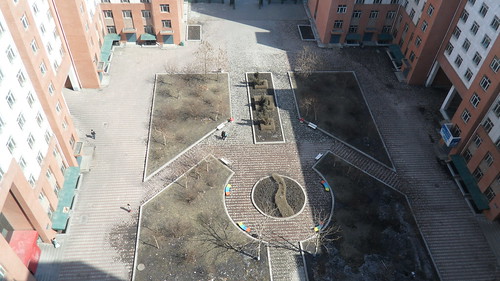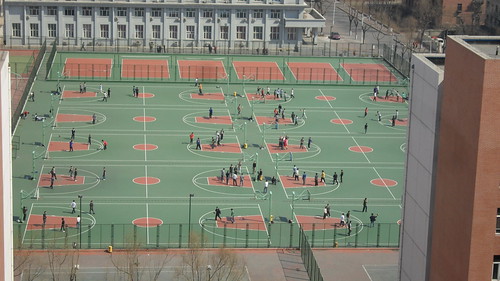Literacy's busting out all over
Read/Post Comments (0)
And so is spring, actually. The courtyard outside my dorm, which looked like this when I got here:

. . . now looks like this:

The basketball court, which, you may remember, looked like this when I got here:

. . . now looks like this:

I've been joking with people that when spring comes to North America, it's marked by the sound of the birds chirping in the morning, but when spring comes to this campus, it's marked by the "tock-tock-tock" sound of basketballs hitting the pavement . . .
I feel like I've finally hit my stride here. I'm moving forward on my China-related long-term goals, which include learning the language and learning to cook. I've finished the official part of my duties here, and have accepted a part-time teaching gig, giving English lessons to 6 Algerian students who need to learn the English vocabulary associated with Materials Science before they can begin formal graduate studies here in the fall. I think this is going to be completely fascinating, and I'm excited that they will speak French, as I'll have a chance to pull out my rusty French, too. (We'll see how my aged brain copes with outputting French and English and Chinese, hehe.)
My most exciting literacy advances lately have been in the area of reading and writing. I'm trying to push myself here, because I am so darned frustrated at being surrounded by print that I can't decipher. (Is it correct to call Chinese characters "print"? I don't know.) My friend Lara (more about her in another post) and I walk around trying to read signs, and we usually come up with some version of "Jiu something Dou Fu something Xiao something something" - Chinese words interspersed with "something" whenever we hit a character we don't understand. (The other day I said to her, "Gee, these people have a lot of characters for 'something,' don't they?")
Anyway, it's slow, but I know I'm making progress. For one thing, I now expect print to be meaningful, and I am attuned to seeing it. The other day I was watching an episode of House, and I could swear I saw Chinese characters on a sign in the background, and my head literally spun towards it in a totally unpremeditated movement, just the way I pick out English words in an otherwise character-based environment. (The difference is, I can actually read the English words.)
Last weekend I was having dinner with a couple of friends, and I saw this pattern on a teapot:

- and I asked my friends if it was simply supposed to be a pattern, or whether it was supposed to be the Chinese character "fei" repeated over and over. (It was just a pattern.)
Still, I'm a long way from looking at characters and just knowing what they mean, just reading them, as I unconsciously read English. Here's a good illustration. The other day the electricity was out in the dorm (a planned outage; took me by surprise because I didn't see the note, having gotten into the habit of ignoring notes). As I was walking down the stairs, I saw this, scrawled on the doors of the sixth floor:
- and I instinctively read "6 liu," liu being the Chinese word for six, and that character being the character for six. Now, I will go to my grave looking at "6" and reading it as "six"; I don't think I will ever get beyond translation in that situation, in any language, even if I lived here for the rest of my days. But still. I didn't have to reach for "liu," because the context was all there. It felt intuitive. (In another context it wouldn't be, but still. For one brief shining moment . . . )
And here's something that makes me rather proud, actually. Yesterday I wanted to go to the grocery store to get some sesame butter. I was studying at the local internet cafe (streaming Statistics lectures; I can't stream anything in my dorm because the net is too slow), and I looked up the characters for sesame paste (which is what they call it here). I wrote the characters down, so I could take the piece of paper with me and match them. There are an infinitely large number of jars containing brown-colored paste here; you can't find it by sight alone.
(As a small aside, I was delighted to discover that the last character was "jiang," which means sauce . . . when my Chinese friends talk about American food, they always use the word "sauce" wrong, as in "strawberry sauce" when they mean jam or jelly, so I know that "jiang" appears in many, many words. It will be very useful to know it. This is a BIG advantage to having non-proficient English speakers around me - their mistakes tell me an awful lot about the Chinese language.)
Anyway, I finished my Stats lectures, then went to the dorm and dropped off my backpack, totally forgetting the piece of paper with the characters for sesame paste. I didn't discover its absence until about a half an hour later, after I'd eaten dinner, and when I was standing in the store, approximately two hours after I'd originally looked the word up. But no matter: I found it.

Yep. I finally, finally have enough understanding of characters (how they are composed, how to read them, how to write them), that I can, in the words of Maria Montessori (or Confucius, depending on who you believe) "do and understand."
The point is, like a child learning to read in her first language, I am developing expectations about print. I can no longer remember what it was like not to be able to read in English, and I can't recover that sense of having words swim into focus like the predictions emerging on an 8-ball, but I'm re-living the experience as I learn Chinese. And jeez, is it FUN! I haven't had this much fun since I was learning English. ^^

. . . now looks like this:

The basketball court, which, you may remember, looked like this when I got here:

. . . now looks like this:

I've been joking with people that when spring comes to North America, it's marked by the sound of the birds chirping in the morning, but when spring comes to this campus, it's marked by the "tock-tock-tock" sound of basketballs hitting the pavement . . .
I feel like I've finally hit my stride here. I'm moving forward on my China-related long-term goals, which include learning the language and learning to cook. I've finished the official part of my duties here, and have accepted a part-time teaching gig, giving English lessons to 6 Algerian students who need to learn the English vocabulary associated with Materials Science before they can begin formal graduate studies here in the fall. I think this is going to be completely fascinating, and I'm excited that they will speak French, as I'll have a chance to pull out my rusty French, too. (We'll see how my aged brain copes with outputting French and English and Chinese, hehe.)
My most exciting literacy advances lately have been in the area of reading and writing. I'm trying to push myself here, because I am so darned frustrated at being surrounded by print that I can't decipher. (Is it correct to call Chinese characters "print"? I don't know.) My friend Lara (more about her in another post) and I walk around trying to read signs, and we usually come up with some version of "Jiu something Dou Fu something Xiao something something" - Chinese words interspersed with "something" whenever we hit a character we don't understand. (The other day I said to her, "Gee, these people have a lot of characters for 'something,' don't they?")
Anyway, it's slow, but I know I'm making progress. For one thing, I now expect print to be meaningful, and I am attuned to seeing it. The other day I was watching an episode of House, and I could swear I saw Chinese characters on a sign in the background, and my head literally spun towards it in a totally unpremeditated movement, just the way I pick out English words in an otherwise character-based environment. (The difference is, I can actually read the English words.)
Last weekend I was having dinner with a couple of friends, and I saw this pattern on a teapot:

- and I asked my friends if it was simply supposed to be a pattern, or whether it was supposed to be the Chinese character "fei" repeated over and over. (It was just a pattern.)
Still, I'm a long way from looking at characters and just knowing what they mean, just reading them, as I unconsciously read English. Here's a good illustration. The other day the electricity was out in the dorm (a planned outage; took me by surprise because I didn't see the note, having gotten into the habit of ignoring notes). As I was walking down the stairs, I saw this, scrawled on the doors of the sixth floor:
6 六
- and I instinctively read "6 liu," liu being the Chinese word for six, and that character being the character for six. Now, I will go to my grave looking at "6" and reading it as "six"; I don't think I will ever get beyond translation in that situation, in any language, even if I lived here for the rest of my days. But still. I didn't have to reach for "liu," because the context was all there. It felt intuitive. (In another context it wouldn't be, but still. For one brief shining moment . . . )
And here's something that makes me rather proud, actually. Yesterday I wanted to go to the grocery store to get some sesame butter. I was studying at the local internet cafe (streaming Statistics lectures; I can't stream anything in my dorm because the net is too slow), and I looked up the characters for sesame paste (which is what they call it here). I wrote the characters down, so I could take the piece of paper with me and match them. There are an infinitely large number of jars containing brown-colored paste here; you can't find it by sight alone.
(As a small aside, I was delighted to discover that the last character was "jiang," which means sauce . . . when my Chinese friends talk about American food, they always use the word "sauce" wrong, as in "strawberry sauce" when they mean jam or jelly, so I know that "jiang" appears in many, many words. It will be very useful to know it. This is a BIG advantage to having non-proficient English speakers around me - their mistakes tell me an awful lot about the Chinese language.)
Anyway, I finished my Stats lectures, then went to the dorm and dropped off my backpack, totally forgetting the piece of paper with the characters for sesame paste. I didn't discover its absence until about a half an hour later, after I'd eaten dinner, and when I was standing in the store, approximately two hours after I'd originally looked the word up. But no matter: I found it.

Yep. I finally, finally have enough understanding of characters (how they are composed, how to read them, how to write them), that I can, in the words of Maria Montessori (or Confucius, depending on who you believe) "do and understand."
The point is, like a child learning to read in her first language, I am developing expectations about print. I can no longer remember what it was like not to be able to read in English, and I can't recover that sense of having words swim into focus like the predictions emerging on an 8-ball, but I'm re-living the experience as I learn Chinese. And jeez, is it FUN! I haven't had this much fun since I was learning English. ^^
Read/Post Comments (0)
Previous Entry :: Next Entry
Back to Top